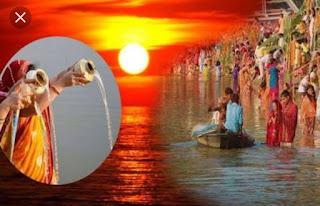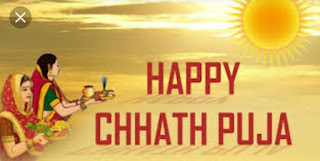The Essence and Significance of Chhath Puja
THE ESSENCE AND
SIGNIFICANCE OF CHHATH PUJA
CHHATH PUJA, SHASHTHI
PUJA or simply CHHATH is
one of the most remarkable and unprecedented festival celebrated with atmost
ecstasy and zeal. What makes it really special is the fact that 'No idol or
statue is worshipped during the rituals rather it involves thanksgiving and
paying tribute to our fundamental physical SUN GOD and his wife GODDESS USHA'.
Not only spiritually and
religiously CHHATH PUJA has great scientific significance too.
It is believed that there is a special Astronomic condition on the sixth
day after diwali(Kartik Amavasya) due to which maximum ultraviolet
rays reach to the earth from the SUN and the effective
celebration of the Festival helps in protecting all kinds of life on the earth
as much as possible.
Also the processes and
rituals of CHHATH PUJA are
designed to benefit the VRATEES (DEVOTEES) in all walks of life whether physical,
mental, psychological or spiritual. Chhath rituals help
devotees in optimum absorption of Vitamin D and Calcium into their body. Mental
benefits include calming the mind to reduction of negative feelings and
emotions.
To dive into the history of CHHATH
PUJA we need to travel to the Ramayan Age and Mahabharat times
Lord Ram and Goddess Sita observed fast on the sixth day(Kartik
Shashthi) after their return to Ayodhya and worshipped SUN GOD and
CHHATHI MAI (SHASHTHI MATA). After the Pandavas were put to exile,
Lord Krishna advised them and Draupadi to fast and follow all
rituals of CHHATH PUJA to turn back their fortunes and the rest as they
say is history under the guidance of Lord Krishna they won the greatest war
their can ever be and got back their kingdom as well as their pride.
According to Mythology King
Priyavd didn’t have any child for a long time but after he had his first
son, joy quickly turned to despair as the infant died unable to bear the trauma
the king tried to sacrifice his life in the cremation ground but that very
moment Lord Brahma’s daughter DEVSENA appeared and asked him ‘To worship her
and encourage others too to worship her in order to be blessed by young ones’
he did so and succeeded and everone else too followed.
Even during the vedic period the
rituals of CHHATH PUJA were followed by Rishis of that period to
live without external intake of food by obtaining energy from sunlight.
The rituals of the festival are rigorous and
are traditionally observed over a period of four days. They include
holy bathing, fasting and abstaining from drinking water( Vratta),
standing in water for long periods of time, and offering prasad (prayer
offerings) and arghya to the setting and rising sun.
The third day is the main festival day (exactly 6th
day from Diwali) of CHHATH PUJA. The devotees maintain 'nirjal vrat(Vrata) on the third day.
It mainly consist of going on river bank and offering 'argha' (offering of
fruits and sweets in winnow ) and surya namaskar to the setting sun
followed by the next day (exactly 7th day from Diwali) event of offering argha
and surya namaskar to the rising sun on the fourth or last day of
chhath. The fast then comes to an end after offering argha to rising sun.
The prasad offerings include sweets,Kheer,Thekua,
rice laddu(made of rice grit) and fruits (mainly sugarcane, sweet lime and
banana) offered in small bamboo. The food is strictly vegetarian and is cooked
without salt, onions or garlic. Emphasis is put on maintaining the purity of
the food.
The main worshipers, called Parvaitin pray for the
well-being of their family, and for the prosperity of their offsprings.
The starting of the CHHATH PUJA is known as "chhath uthana"
and stopping is known as "chhath baithana". Once a family
member starts performing Chhath Puja, it is their compulsory duty to
perform it every year and to pass it on to the following generations.
Although the fast is observed by only a few
members each and every family member rejoices and has an extraordinary time
celebrating CHHATH PUJA.
Thus CHHATH PUJA has
rich history as well as sound Chemistry.
**THE END**







Comments
Post a Comment